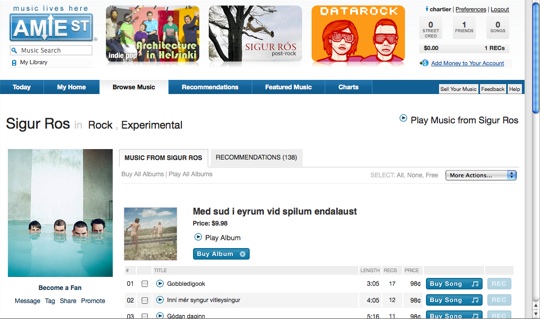Since launching in July 2006, indie music store Amie Street has been making a name for itself with a variable pricing model, unique social features, and scoring some big-name artists. Amie Street surprised the industry last August with a Series A financing investment from Amazon, of all companies, and today a deal was announced to sell over 1 million new songs from indie distributor The Orchard.
In a press release at The Orchard's site, the company announced that it is offering over 1.1 million songs to Amie Street from its catalog. The labels on board for this deal include Temporary Residence, Daptone, Dim Mak Records, Vice Music, Surfdog, Audio Dregs, Huume Records, Decon Media, Chocodog Records, Gern Blandsten Records, Park The Van/Cornerstone RAS, Up Above Records, Lookout Records, Ernest Jenning Record Company, and Truth & Soul LLC.

"The partnership is a significant validation of the consumer-empowering business model AmieStreet.com is pioneering," The Orchard says in its press release. "On AmieStreet.com, songs are priced based on their demand, and customers receive money for more downloads when they recommend their favorite songs. By allowing consumers to drive the price of music, a song's price becomes a measure of its popularity, enabling people to discover new music with more ease and convenience."
Amie Street's pricing model for all music is appealingly clever. All tracks are offered for the low, low price of "free" when they first appear on the site. As a track grows in popularity and more users download it, though, its price begins to rise. The price for any single track tops out at 98¢, but as we saw in March last year, tracks from a popular band like Barenaked Ladies can shoot from 55¢ to 98¢ in just a day. Amie Street keeps the first $5 of a song's sales, and 30 percent of all revenue thereafter, whereas most other digital outlets like iTunes Store are said to take around 70 percent.
With such a clever new business model that is both pro-consumer and pro-artist, as well as social features that allow for things like the embedded music player you see above, it's no surprise why Amie Street continues to carve out a name for itself in digital music distribution. The site certainly has some some quirks—needing to prepurchase song credits in bundles and a lack of a wishlist with which to save purchases for later at the top of our list—but the company, overall, seems to be on the right track.
Update
We've received clarification from Amie Street and The Orchard on some of the key points of this deal. First, The Orchard's catalog offering to Amie Street is an opt-in deal for labels; not every label has signed on yet, and The Orchard is pursuing more labels to add over time.
More interestingly, though, is the fact that, while most other digital outlets like iTunes Store, Amazon's MP3 Downloads store, and Zune Marketplace reportedly take closer to 70 percent of every track sale, Amie Street only takes 30 percent after the original $5 is met; not the 70 percent we originally printed.
reader comments